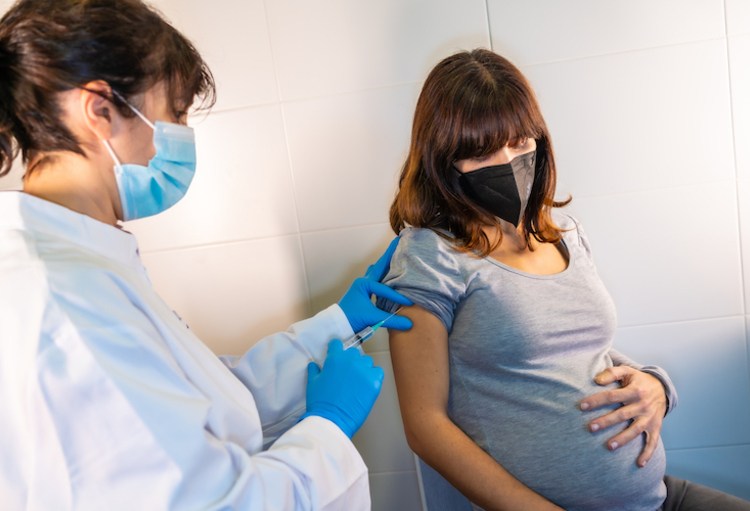In a conscious effort to debunk a number of prejudices, the Brussels health authorities worked together with specialists to get the correct information regarding Covid-19 vaccination and fertility and pregnancy out in the world.
Concerns regarding the Covid-19 vaccines' effect on fertility are one of the most important reasons that people - particularly younger ones - hesitate to get a shot, says Fatima Boudjaoui, spokesperson for the Joint Community Commission (Cocom).
"We have received many questions about the vaccine's effect on fertility in general, but we noticed that we got them a lot more in these last few weeks," she told The Brussels Times.
"We are getting a lot of questions around the effects of vaccines on fertility and pregnancy, but especially on fertility, both for men and women," Boudjaoui said, adding that the questions usually come from younger people.
"We are noticing it more now because we are working with local vaccination points," she said. "We have also been vaccinating mainly young people for a few weeks now, and we see that the vaccination rates for them are not that high, and fertility is one of the concerns of that target group."
No evidence for fertility issues
So far, there is no evidence that RNA vaccines have a negative impact on fertility. "Given the way in which these vaccines work, it is unlikely that this will change in the future," the authorities stated.
The fear that led to this rumour about the vaccine stems from a small similarity between the 'Spike' protein of the coronavirus and a protein that plays a role in the formation and function of the placenta, Cocom explains.
"However, these similarities are far too small to cause a cross-reaction," it stated. "Additionally, the data on the influence of vaccination on sperm quality is reassuring."
Infection with the coronavirus is a different story: it can sometimes cause temporary abnormalities in this area and can therefore affect fertility.
"Ultimately, this means that the vaccine also offers the best protection in this regard."
On top of that, the European Society of Human Reproduction and Embryology even recommends that vaccination should not interfere with pregnancy, assisted reproduction or breastfeeding.
For breastfeeding, analyses show that the vaccine does not pass into the milk, but that the antibodies produced by the mother do, meaning they can protect her child.
Similarly, antibodies can be passed through the placenta to protect the unborn child, the same way they do with immunity to other diseases.
Related News
- Research: Placenta acts as a barrier to protect from Covid
- New advice: pregnant women should get priority vaccination
- Flanders keeps vaccination centres open until end of 2021
On the other hand, an unvaccinated mother-to-be is at greater risk of developing a severe form of Covid-19, which can endanger both the pregnancy and the baby (increased risk of miscarriage and pre-eclampsia).
"So there is a real risk for unvaccinated pregnant women to end up in intensive care," stressed Cocom. "In contrast, with vaccination, thousands of pregnancies in the US showed that there is no danger either to the mother or to the unborn child."
Additionally, due to the antibodies they receive from their mother through the placenta and breast milk, newborn babies are protected against infectious diseases for several months.
"This gives the baby a great extra advantage, because its immune system is still immature," Cocom said, stressing that vaccination of pregnant women is therefore not only harmless for the child, there are also no serious side effects for the pregnancy and it ensures that the child is better protected during the first months of life, when it is most vulnerable.
Altered menstrual cyclus
Various testimonies linking vaccination with disturbances to the menstrual cycle have been circulating on social media for some weeks now, but it is difficult to say for certain whether there is a causal link with the vaccine, according to the health authorities.
They point to the fact that an altered menstrual cycle can depend on many factors including stress, changes in eating habits, very intense physical activity, depression, gynaecological diseases, the use of medicines, and many others.
At the same time, the Federal Agency for Medicines and Health Products (FAMHP) notes only about 100 reports of this type of side effect for the vaccines currently in use in Belgium.
"So, we have a wide variety of causes for a very common condition combined with low reporting in the post-vaccination monitoring system." While the authorities cannot exclude a link in some cases, there is currently also no statistical evidence to prove that link.
Apart from the inconvenience of a changed menstrual cycle, there is no effect on fertility or threat to a person's health, as the condition is usually temporary.
When a cycle disorder is prolonged or worrisome, however, a suspected link to vaccination should not prevent someone from consulting a specialist for clarification, stresses Cocom.
"The fact that a vaccine was administered does not mean that there cannot be another (possibly severe) cause."
People who suspect a link between vaccination and their altered cycle are asked to report this here.

